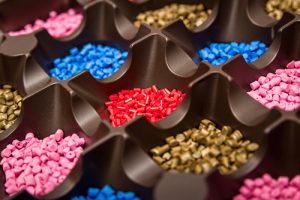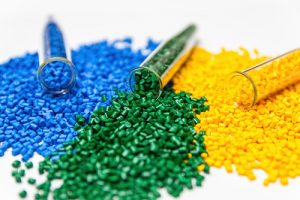Different types of resins feature different properties and benefits. Understanding their characteristics is essential for choosing the proper material for your plastic injection molding project and ensuring optimal manufacturability and product performance. Whether you need components for automotive industry or medical use, learning more about the most common types of resins will help you opt for the adequate material.
What are common materials used for plastic injection molding?
 Processing requirements such as molding pressure and melting temperature alongside end-use properties such as impact resistance and tensile strength are essential characteristics to consider when selecting the right resins for your project. These are the properties of 5 most commonly used resins:
Processing requirements such as molding pressure and melting temperature alongside end-use properties such as impact resistance and tensile strength are essential characteristics to consider when selecting the right resins for your project. These are the properties of 5 most commonly used resins:
ABS
Acrylonitrile butadiene styrene (ABS) features superior strength, impact resistance, toughness, and temperature resistance. It combines the rigidity and strength of styrene and acrylonitrile with the toughness of polybutadiene rubber. It provides a glossy, colorfast effect and features a quality surface finish. It adheres easily to itself, metal coatings, and similar types of plastic.
Most common applications include telephone handsets, appliances, computer housings, golf club heads, musical instruments, lawn mower covers, medical devices, canoes, motorcycle helmets, toys, luggage, enclosures for electronic assemblies, showerheads, handles, and exterior and interior automobile trim.
However, ABS doesn’t feature high chemical resistance, and isn’t suitable for applications requiring UV resistance or electrical insulation.
Acetal
Acetal, polyoxymethylene (POM), polyformaldehyde, or polyacetal, offers excellent creep and wear resistance, toughness, good heat distortion, easy colorization, low moisture absorption, and good chemical solvent resistance. It also provides high dimensional stability and excellent stiffness.
Its scope of application includes automotive, mechanical, and food and beverage industries, household items, toy parts, bearings, and gears. It’s especially suitable for point-of-contact parts due to its ability of minimizing the friction. These are parts such as guitar picks, plastic buckles, and pinch valves.
Polypropylene
Polypropylene (PP) features excellent chemical resistance, fatigue resistance, toughness, elasticity, transmissivity, and insulation properties. While it’s flammable and susceptible to UV radiation, it does provide good resistance to electricity and chemical solvents.
You can easily customize polypropylene by altering the manufacturing process or introducing additives. This allows for a wide array of different uses, including household appliances, construction, automotive, and equipment, packaging, and electrical manufacturing industries, toys, living hinges, washing machine drums, textiles, bottle caps, and medical components.
HIPS
High-impact polystyrene (HIPS) offers excellent machinability, good impact resistance, superior aesthetic qualities, highly customizable surfaces, and dimensional stability. It’s cost-efficient, and you can easily bond, decorate, glue, and print it.
Most common applications of HIPS include printing of display materials, promotional signs, garden tags and stakes, retail packaging, posters, and graphic arts, printing equipment, appliance components, toys, bicycle trailers, TV and AV equipment parts, cold and hot drinking cups, and gasoline tanks.
LDPE
Low-density polyethylene (LDPE) is the most flexible polyethylene type, featuring high-impact strength, excellent moisture resistance, waterproofness, good translucence, and chemical resistance.
It’s used in a variety of everyday applications and products such as agricultural products, consumer goods and housewares, electronic wiring, medical products, toys, juice boxes, six-pack rings, containers, bottles, caps, and lids.
What is the leading plastic injection molding company?
